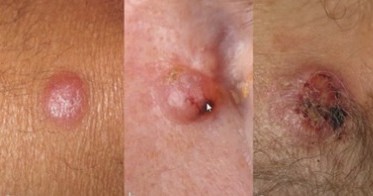A rare, aggressive form of skin cancer has been on the rise recently. Merkel cell carcinoma (MCC), also known as Merkel cancer, is that disease.
“Merkel cell carcinoma is a very aggressive skin cancer that has characteristics of epithelial cells and endocrine cells,” said Professor Lee In-hee of the Department of Hematology-Oncology at Kyungpook National University Chilgok Hospital, on the Korean Blood Disease and Cancer Association's YouTube channel “KBDCA.”

Merkel cell carcinoma usually affects Caucasians. The country-specific incidence rates of Merkel cell carcinoma are Australia (0.82 to 2.5 per 100,000 population), New Zealand (0.88 to 0.96 per 100,000 population), the United States (0.66 to 0.79 per 100,000 population), and Europe.
It is rare in blacks, Hispanics, and Asians. The incidence among white individuals is about eight times higher than in non-Hispanic Black individuals.. It also affects men 2.5 times more often than women.
The incidence of rare Merkel cell carcinoma has been increasing in recent years, mainly due to population aging. The average age of a patient at diagnosis is about 77 years, and the incidence of MCC is known to increase with age.
“The incidence of MCC has increased by about three to five times from 1985 to 2013,” Professor Lee said. “In addition to the increase in the actual incidence due to the number of elderly patients, diagnostic techniques, such as immunostaining, were not developed in the past, but with the development of these techniques, the incidence of MCC is increasing due to the refined diagnosis.”
One of the risk factors for Merkel cell carcinoma is exposure to ultraviolet light.
“MCC is more likely to occur in skin exposed to sunlight,” Lee said, noting that avoiding UV exposure is as essential for Merkel cell carcinoma as it is for other skin cancers.
Another risk factor is people who are immunosuppressed due to illness or treatment.
“Some 6-12 percent of patients with MCC are immunosuppressed,” Lee said, noting that the disease is more likely to occur in people with hematologic malignancies, such as chronic lymphocytic leukemia, HIV/AIDS, and organ transplant patients. Infection with Merkel cell polyomavirus also increases the risk of developing Merkel cell carcinoma.
“Merkel cell polyomaviruses can be ubiquitous and can be asymptomatic infections,” Lee said. “If you have an immunosuppressed state with these infections, you may be at increased risk of developing Merkel cell carcinoma.”
MCC appears on the skin in various ways. It can appear as a slightly raised, red spot or resemble basal cell carcinoma, characterized by visible blood vessels inside and areas of pigmentation. Unlike melanoma, it may only be partially pigmented. Merkel cell carcinoma also presents in various forms, including ulcerated and indistinct nodules.
The treatment of MCC varies depending on whether the cancer is localized, meaning it's confined to the skin where it first started, or if it has spread to other parts of the body. In the first case, if the cancer is localized, extensive excision and radiation therapy are performed if surgery is possible.
"If the area is too large to be operated on, radiation therapy can be given first or immunotherapy can be given together," Professor Lee said.
Additionally, a lymph node biopsy is performed to check for lymph node metastasis, and lymph node dissection or radiation therapy may be recommended if lymph node metastasis is detected.
In advanced stages, the preferred treatment is to participate in a clinical trial. "Because it is so rare, there is not much data from phase 3 clinical studies, and immuno-oncology drugs are used as standard treatment, but due to limited data, clinical trials remain essential" Lee explained.
"In the absence of clinical trials, we use immuno-oncology drugs, including avelumab, pembrolizumab, and nivolumab. If there is a recurrence after that, we can use cytotoxic antitumor drugs with radiotherapy or chemotherapy, but the evidence is very weak," Lee said, pointing out the current limitations.
Immune checkpoint inhibitors, the third generation of immuno-oncology drugs following first-generation cytotoxic and second-generation targeted agents, are currently the most effective treatment option for advanced-stage Merkel cell carcinoma. Avelumab, pembrolizumab, and nivolumab have demonstrated effectiveness in clinical studies.
"Avelumab is supposed to be more effective not only by inhibiting PD-L1, which causes T cells to attack cancer cells continuously, but also by causing immune cells called NK cells to attack cancer cells continuously," Lee said.
In the clinical study of avelumab, 19 out of 116 patients, or about 16 percent, achieved a complete response (complete absence of cancer), 23 percent had a partial response, and 10 percent had stable disease.
"About 48 percent of patients had disease progression despite treatment, but this is a good effect, so we treat them," Professor Lee said.
Pembrolizumab was found to be more effective in patients with Merkel cell polyomavirus-positive Merkel cell carcinoma. In a first-line trial of 26 patients with metastatic MCC, when treatment response was stratified by viral infection status, patients with viral-positive MCC showed a better prognosis.
Some people are at higher risk of recurrence after treatment for MCC. Patients with initial MCC larger than two centimeters, chronic immunosuppression, initial MCC in the head and neck region, lymph node positivity, or lymphovascular infiltration on pathologic examination are at high risk for recurrence and need to be vigilant.
"Surgery and radiotherapy are recommended for locally curable cases of Merkel cell carcinoma, and immune checkpoint inhibitors can be used to treat inoperable stages," Professor Lee said. "Sun protection is important to prevent Merkel cell carcinoma, so it is recommended to pay attention to sun protection."

